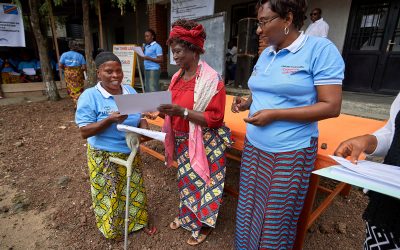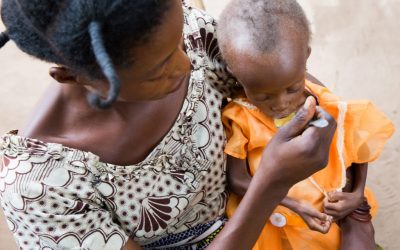Health systems support in the DRC
Appui au Système de Santé en RDC | ASSR
Reducing mortality and morbidity of women, adolescents, children and newborns and building human capital through a stronger health system and empowered communities.
ABOUT ASSR
In French, ASSR stands for Appui au Système de Santé en RDC, which translates into Health Systems Support in DRC. It is an three year project funded by the Foreign, Commonwealth
& Development Office using UK aid that is building on the accomplishments of the recently completed Accès au Soins de Santé Primaire, known locally as ASSP, which was also funded by UK aid and was implemented during the preceding six years.
Project Goal
The overall project goal is to improve the health of women, adolescents, and children through support for disease prevention, delivery of health care and health systems strengthening. It is structured around the six pillars of health systems strengthening, specifically: enhanced health service delivery and quality, improved and sustained human resources, enhanced and appropriate use of medicines and technologies, increased affordability of health services, enhanced health information systems and, lastly, enhanced leadership and governance.
The project also incorporated COVID-19 response in the targeted health zones in Kinshasa and the provinces covered by ASSR.
Implementation Period
Phase 1 – April 2019 to September 2020
Phase 2 – October 2020 to September 2021
Phase 3 (final) – October 2021 to March 2022
Project Cost
£46,000,000
Donor
The Foreign, Commonwealth and Development Office (FCDO)
The project supported 9.7 million people across 50 health zones.
ASSR worked in four provinces: Kasaï, Kasaï Central, Maniema, and Nord-Ubangi.
people served
health zones
provinces
Map of Project Health Zones
All phases
Phase 1 only
impact
57% Decrease in Malnutrition
From April 2020 to March 2022, the prevalence rate of children 6 – 59 months, with a mid upper arm circumference of 12.5 cm or less, has decreased by 57%, falling from 12.3% to 5.3%.
Read more about IMA’s revolutionary work to combat malnutrition here.
5% lower in case fatality rates of mothers
The average of case fatality rates for ASSR provinces was 5% lower than the average for non-ASSR provinces.
Read more about tracking maternal mortality here.
100% of births attended by skilled personnel
The percentage of births attended by skilled personnel at the beginning of ASSP was 90%. At the end of ASSR, we reached 100% of deliveries.
Read more about our programs to make deliveries safer here.
Number of pregnant women who received three doses of IPT while attending antenatal care (113% of Target)
Number of 1-yr-old children vaccinated against measles (106% of Target)
Number of Couple Years of Protection achieved through family planning service provision (116% of target)
Number of deliveries attended by a skilled birth attendant (100% of Target)
Service utilization for curative services (100% of target)
Percent of sexual and gender-based violence survivors that received a PEP Kit at a health facility within 72 hours of a rape incident
Number of children between 6 and 59 months screened for malnutrition by community volunteers each quarter
Recovery rate of malnourished children between 6 and 59 months at 5th visit
ASSR Programs
ASSR progams are building on the successes of the recently completed ASSP project. Click on any link below for more detailed information.
Medicine

Family Planning

Safe Deliveries
Immunizations
Hospital Management

DHIS2

Malaria
Improving Access

Leadership & Governance
Gender & SGBV
Partners
IMA World Health was selected as the consortium lead to implement the ASSR project in collaboration with the Ministry of Health. In addition to acting as consortium lead, IMA oversees project implementation at the provincial level in Maniema and Nord Ubangi, while Sanru is responsible for project implementation in Kasai and Kasai Central. Two technical partners provide assistance at the national level: Pathfinder (Reproductive Health and Family Planning) and BAO Systems (Health Information Systems).




read more about our work to improve access to primary health care in the drC through ASSP
DFID and the SIDA allocated £182,899,146 to support the Government of the Democratic Republic of Congo’s efforts to improve the health of its citizens. Accordingly, IMA World Health was selected as the lead organization to implement ASSP and in collaboration with the MOH. In addition, four implementing partners support the program at the provincial level: SANRU, World Vision, CARITAS and International Rescue Committee. Finally, four technical partners provide assistance at the national level: Tulane University (Operational Research), Pathfinder (Reproductive Health and Family Planning), HISP (Health Information Systems) and IntraHealth (Human Resource Information Systems).
Quarter 1 Results
Number of pregnant women who received three doses of IPT while attending antenatal care:...
Saved by my Son: A Tushinde Ujeuri Success Story
"The support from the Tushinde program has restored my will to live." Tushinde Ujeuri Project...
Combatting Malnutrition in DRC: A Nutrition Success Story
Community relays in Ndesha, Kasai Central are successfully combatting malnutrition in the DRC...
QUICK CONTACTS
Recent Posts
Quarter 1 Results
Number of pregnant women who received three doses of IPT while attending antenatal care: 58,495Number and percentage of 1-yr-old children vaccinated against measles: 78,123Number of Couple Years of Protection (CYPs) achieved through family planning service provision:...
Saved by my Son: A Tushinde Ujeuri Success Story
"The support from the Tushinde program has restored my will to live." Tushinde Ujeuri Project brings hope to one survivor of sexual and gender-based violence in DRC It was mid afternoon, and my 10 year-old son and I were walking home from working in the fields. When...
Combatting Malnutrition in DRC: A Nutrition Success Story
Community relays in Ndesha, Kasai Central are successfully combatting malnutrition in the DRC thanks to ASSP's nutrition training. Combatting Malnutrition One Maman at a TimeMado Betu was a young child of two years and four months but was frail and unable to walk when...




